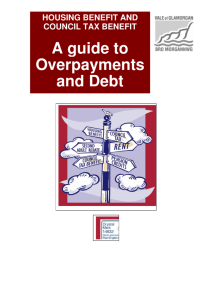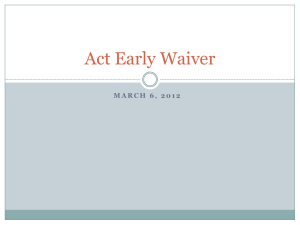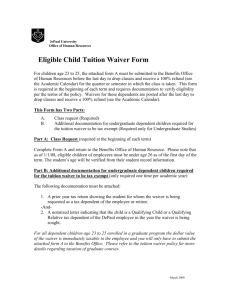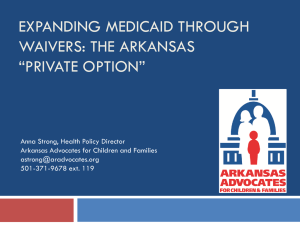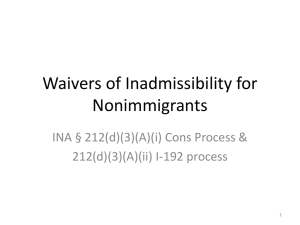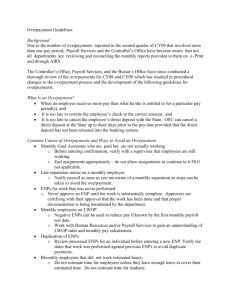SECRETARY OF STATE WAIVER - Child Poverty Action Group
advertisement
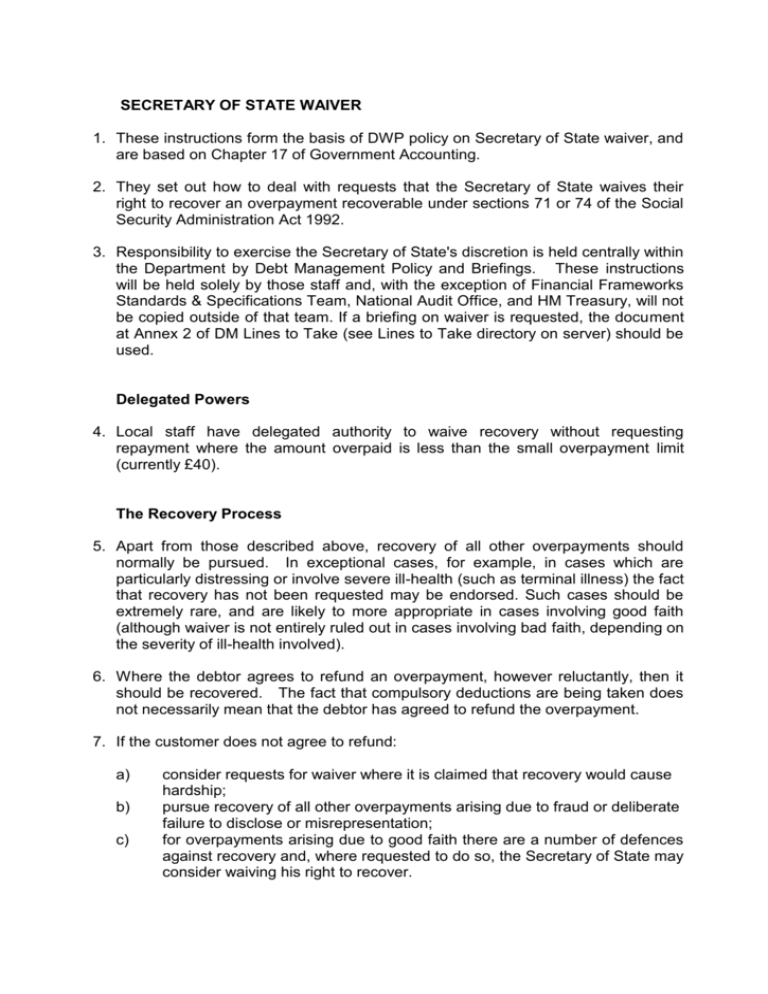
SECRETARY OF STATE WAIVER 1. These instructions form the basis of DWP policy on Secretary of State waiver, and are based on Chapter 17 of Government Accounting. 2. They set out how to deal with requests that the Secretary of State waives their right to recover an overpayment recoverable under sections 71 or 74 of the Social Security Administration Act 1992. 3. Responsibility to exercise the Secretary of State's discretion is held centrally within the Department by Debt Management Policy and Briefings. These instructions will be held solely by those staff and, with the exception of Financial Frameworks Standards & Specifications Team, National Audit Office, and HM Treasury, will not be copied outside of that team. If a briefing on waiver is requested, the document at Annex 2 of DM Lines to Take (see Lines to Take directory on server) should be used. Delegated Powers 4. Local staff have delegated authority to waive recovery without requesting repayment where the amount overpaid is less than the small overpayment limit (currently £40). The Recovery Process 5. Apart from those described above, recovery of all other overpayments should normally be pursued. In exceptional cases, for example, in cases which are particularly distressing or involve severe ill-health (such as terminal illness) the fact that recovery has not been requested may be endorsed. Such cases should be extremely rare, and are likely to more appropriate in cases involving good faith (although waiver is not entirely ruled out in cases involving bad faith, depending on the severity of ill-health involved). 6. Where the debtor agrees to refund an overpayment, however reluctantly, then it should be recovered. The fact that compulsory deductions are being taken does not necessarily mean that the debtor has agreed to refund the overpayment. 7. If the customer does not agree to refund: a) b) c) consider requests for waiver where it is claimed that recovery would cause hardship; pursue recovery of all other overpayments arising due to fraud or deliberate failure to disclose or misrepresentation; for overpayments arising due to good faith there are a number of defences against recovery and, where requested to do so, the Secretary of State may consider waiving his right to recover. 8. Each case will be examined on its individual merits, and, in deciding whether waiver is appropriate consideration will be given to: a) the type of overpayment; b) whether the payee received the money in good or bad faith - ie, whether the person overpaid was culpable in any way; c) the length of time since the overpayment was made; d) whether recovery will have a detrimental effect, and any relevant personal circumstances of the payee; e) any defences against recovery; f) the cost-effectiveness of recovery action; g) the need to deal equitably with overpayments to a group of people, and whether recovery is unfair in relation to how other people were treated. 9. All cases for waiver must be authorised centrally. 10. Reason for waiver must be defensible - the test will be whether the decision can be defended to NAO. 11. Reasons for waiver must be documented. This will be done through recording cases waived on the list provided for that purpose; showing name, national insurance number, type and amount of benefit waived, and the reasons for waiver (including reference to GA). Cases which are waived must be recorded on the appropriate unit’s losses statement. Offices will do this by recording the amount overpaid as a write-off on OpRec. Authority delegated to Debt Management 12. Debt Management have delegated authority to waive cases involving severe hardship up to the maximum value of £100,000 (one hundred thousand). 13. Debt Management have delegated authority to waive cases under any of the other criteria only where the value of the amount to be waived is less than £1,000 (one thousand). Waiver of cases with a value under £1000 on grounds other than hardship must be approved by an officer of at least HEO grade. Cases over this amount, or which are considered to be “novel or contentious”, must be approved by Treasury. 14. A case might be described as novel or contentious if it does not meet any of the criteria set out in this document but officials nonetheless feel that recovery should not be pursued. Although the de-minimus level for referral of cases to HMT is £1000, Treasury have requested that any cases involving questions of principle or which might repercuss in a significant way are referred to them regardless of the amount. Referral to HM Treasury 15. Hardship cases which are in excess of £100,000, or cases which are novel or contentious, should be referred to Treasury for approval. 16. Cases should be e-mailed to the Labour Market Policy Team. 17. The note should provide: a synopsis of events and/or general summary of the details of the case setting out why we think the case is suitable for waiver, including reference to GA where appropriate; a copy of the MP’s/representative’s letter setting out why they think waiver appropriate. 18. Cases should be BF’d for two weeks for HMT’s reply. In MP’s correspondence cases where we cannot reply to the deadline the response to the MP should state that “in view of amount involved/circumstances leading to this overpayment, Mr/Mrs X’s case has been referred to HMT for consideration” or similar. 19. Cases in excess of £100,000 will need separate recording in the accounts and should be copied to the Group Finance Directorate Finance Contact and the Accounting Group contact with responsibility for producing the accounts. Collective overpayments 20. If a group of people have all been overpaid as a result of the same mistake then each person should be treated equally as regards the degree of recovery required. 21. They should be invited to repay on the same basis; unless: a) they can claim one of the defences against recovery listed below; or b) it would not be cost-effective to pursue recovery of a particular individual. 22. Just because one individual cannot be pursued for one of these reasons does not prevent the rest of the group being pursued. 23. If it is decided that it would not be fair to seek recovery of the whole or part of a collective overpayment and the Department wishes to waive the right to recovery then Treasury must be consulted before any write-off action is considered. Any such decision would clearly be exceptional and must be defensible on the grounds of value for money or public interest. 24. For more information see GA 17.2.12. FACTORS DETERMINING WAIVER 25. Where the customer has acted in good faith there may be defences against recovery- but good faith alone is not a valid defence. 26. A customer could be said to have acted in bad faith where they have deliberately failed to disclose or misrepresented a material fact; including cases where a person has been prosecuted for fraud or has accepted a caution or administrative penalty. 27. The test of good faith provided by GA is to consider the extent to which: a) the overpayment arose due to changes to the debtor’s circumstances which they were required to notify; and b) the basis on which entitlement was calculated was explained to, or readily accessible to the debtor. 28. The test of good faith is different to that of recoverability. Just because a decision maker has determined an overpayment to be recoverable due to failure to disclose or misrepresentation does not mean it has arisen in bad faith. 29. Although each case needs to be judged separately, it is possible that overpayments caused by innocent misrepresentation, or where disclosure was made to the wrong office, might be deemed to have arisen in good faith. 30. Where requested to do so, consideration might be given to the circumstances leading to the overpayment. Remember when considering this that new information may have come to light which the decision maker might not have been aware and which could lead them to change their decision that the overpayment is recoverable. 31. However, it is unlikely that these grounds taken in isolation would constitute sufficient reason for waiver. It is more likely that the circumstances leading to the cause of an overpayment, when considered in addition to other factors such as claims of hardship, might provide sufficient reason for recovery not to be pursued. In such cases, the degree of hardship caused might not be as severe as where waiver is claimed on hardship alone. It is the cumulative effect of a number of factors which makes waiver appropriate. 32. Remember the advice in paragraphs 12-14 above on the cases which require referral to the Treasury for approval before waiver is agreed. Defences Against Recovery 33. Legal advice should be considered in all cases where such defences are put forward. Change of position 34. This might be where a person had come to rely on the extra benefit they received and argues that they have not spent the sum overpaid on anything in particular, but on things such as a better standard of food or (within reason) clothing etc. 35. Just because the debtor spent the money does not in itself mean that waiver is appropriate; the debtor must show that he has altered his mode of living or undertaken commitments which he would otherwise not have done. 36. The debtor may have even contacted the Department to query whether the money in question was rightfully theirs. However, if the amount overpaid was particularly high, making a cursory inquiry over the telephone to a very junior official would not be considered reasonable grounds to avoid repayment. 37. This defence would only be valid in exceptional circumstances. 38. Even if the claimant puts forward this defence, any part of the overpayment not yet spent can be recovered. Estoppel 39. This would apply where a member of staff told the debtor that they were actually entitled to the money involved; such as where a claimant receives a payment and contacts the office to query whether they are actually entitled to it, is told that they are entitled to it, and then subsequently told they are not and must pay it back. 40. This might also apply where the debtor replies to a request for repayment stating reasons why repayment should not be made and does not receive a response, or if he does, does not receive it within a reasonable timescale. This would almost certainly lead the person to believe that their reply was satisfactory and could keep the overpaid sum in question. What is a reasonable timescale for response might vary from case to case, and if an office usually takes a number of weeks, or even months to reply to correspondence, then this should be considered reasonable. 41. This would only apply where: a) the claimant has been told that the money overpaid was properly paid and is rightfully theirs; and b) the claimant has changed his position in good faith (ie, by spending the money or entering into some commitment before they were informed of the overpayment); and c) the overpayment was not mainly due to error by the claimant. 42. The claimant does not have to have spent all the money. If they provide a valid defence against recovery on grounds of estoppel, then no recovery action is possible even if they still possess any part of the sum overpaid. The Department intended the claimant to have the money regardless of the mistake 43. This might be in cases where the debtor was due the sum overpaid through underlying or notional entitlement to another benefit 44. Where the debtor claims they met the basic qualifying conditions for another benefit then the Department meant that the debtor should be entitled to that unclaimed benefit instead of the one claimed. 45. Remember that this will be only in cases where the overpayment arose in good faith, and the debtor claimed the wrong benefit, rather than in cases where the debtor discovers underlying entitlement to another benefit after they were caught committing fraud. Hardship 46. Consider whether hardship would result if recovery were to be pursued. This is the only defence which can be applied irrespective of whether the overpayment arose in good or bad faith. Debt Management have delegated authority to waive on hardship grounds up to a maximum value of £100,000. 47. Pleas of hardship must be supported by reasonable evidence that the recovery proposed by the Department is be detrimental (ie, have a significant effect on) to the welfare of the debtor or the debtor’s family. 48. The recovery of an overpayment from any person in receipt of benefit is almost certain to cause some hardship and upset for them and their family. As the Secretary of State has a responsibility to protect public funds, it is the level of hardship and upset which is taken into account when considering the application for discretion. 49. Where hardship is claimed because either the customer or a member of their family is seriously ill, it is expected that supporting evidence will be provided to explain how or why the recovery of the overpayment would be detrimental to the health or welfare of the customer or their family. Note that this evidence does not necessarily have to come from a doctor or even a recognised medical expert, and care should be taken in managing expectations so debtors are not led to believe that their request for waiver will be approved simply by the production of a letter from their GP supporting their request. 50. Where hardship is claimed on financial grounds, the problems would need to be over a long period of time. Full details of the income and expenditure of the customer, their family, and any other members of the household would be needed. If agreed, an application under financial difficulties usually results in a reduced rate of recovery, which is reviewed regularly. Cases where debtor or dependant are terminally ill 51. Care should be taken when dealing with requests for waiver from those who are terminally ill or who have a terminally ill dependant (including those receiving DLA under special rules). These cases need to be handled sensitively, but more in terms of the wording used and approach taken rather than thinking that all such cases should be waived. 52. The approach to be taken will depend whether it is the debtor or one of their dependants who is terminally ill. 53. The general approach should be whether recovery of the overpayment in question would be detrimental to the health or welfare of the individual or their family. 54. Remember that there are alternatives to waiver and if there is potentially an estate from which recovery could be pursued it might be more appropriate to suspend recovery until the death of the terminally ill person. 55. If the debtor themselves are terminally ill and there is no obvious potential estate, that does not necessarily mean that there are no potential assets - the claimant might not have disclosed them – and it might be more appropriate to suspend recovery. 56. If the debtor claims that the mere existence of the debt (rather than actual recovery) is making them ill or might bring about deterioration in their condition then consideration should be given to waiver – but again, if there are obvious potential assets caution should be taken. 57. The debtor should not be contacted asking them to substantiate either their medical condition (or that of their dependants) or financial circumstances. 58. In cases where it is not clear whether there are any assets it is recommended that recovery is suspended. 59. If the terminally ill person is a child then it is unlikely that there will be an estate and the case should be dealt with at face value. The approach to be taken will depend on the wording of the request that has been made from the claimant or their representative. If hardship is claimed think carefully about whether this will be resolved following the death of the terminally ill person – and recovery might commence after a suitable period of time has elapsed after death. Cost-Effectiveness Of Recovery Action 60. This may vary depending upon the circumstances, but should only arise in exceptional circumstances. This is likely to be in cases where the debtor challenges the Department’s right to recover. This would apply to any overpayment, irrespective of whether they arose in good or bad faith, although waiver of such a case would be considered novel or contentious if it arose due to bad faith and would need to be cleared with HMT- see paragraph 12 above. 61. If recovery will be challenged by the debtor through the courts then legal guidance should be sought, including: a) the cost of defending against such action in relation to the size of the debt; and b) the possible impact on other cases should the challenge be successful (eg, if challenged by judicial review impact may be wide-ranging). WAIVER FLOW-CHART Does the recipient agree, albeit reluctantly, to repay the overpayment? Yes No Proceed with recovery action Go to next Did the recipient receive the overpayment in bad faith? Yes No Waiver only possible on cost-effectiveness or hardship grounds – and only where justification is exceptional Go to next HMT approval likely to be required if over £1,000 Does the recipient argue that the have spent the money on a better standard of living in reliance upon the sum overpaid? Yes No Consider waiving recovery on grounds of change of position but recover any balance outstanding (see GA Annex 17.4) Go to next HMT approval required over £1,000 Does the recipient allege they were told the money was rightfully theirs and has since spent it in good faith? Yes No Consider waiving recovery on grounds of estoppel (see GA Annex 17.4) Go to next HMT approval required if over £1,000 Does the claimant allege that they claimed the wrong benefit and had underlying entitlement to another unclaimed, benefit? Yes No Consider waiving recovery on grounds the Department intended that the claimant had the money anyway, regardless of the mistake (see GA 17.2.9 b iii) Go to next HMT approval required if over £1,000 Is it clear that recovery action would not be cost-effective? Yes No Waive on cost-effective grounds (see GA 17.2.11) Go to next HMT approval required if over £1,000 Has hardship been claimed and would recovery cause genuine hardship to the recipient or to his family? Yes No Repayment may be waived in part or whole if genuine hardship would be caused (see GA 17.2.10). Recover overpayment AIDE-MEMOIRE Ensure that the appropriate GA reference is recorded against any overpayment where recovery is waived. Reason Change of position Estoppel Dept intended claimant to have money regardless of mistake Hardship Recovery is not cost-effective Details Overpayment arose in good faith and claimant came to rely on extra money and spent on a better standard of living Overpayment arose in good faith, claimant told they were entitled to sum overpaid, and spent it in good faith Overpayment arose in good faith but claimant claimed wrong benefit and had underlying entitlement to another Recovery would be detrimental to the welfare of the claimant or their family; or The overpayment arose in good faith, and the circumstances leading to the overpayment were such that recovery would not be fair and would have a detrimental effect on the welfare of the claimant or their family Debtor challenges Department’s right to recover and solicitors advise recovery not cost-effective GA Ref GA 17.2.9 b i GA 17.2.9 b ii GA 17.2.9 b iii GA 17.2.10 GA 17.2.11
